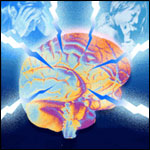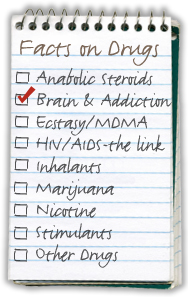
Think about how you feel when something good happens-maybe your team wins a game, you're praised for something you've done well, or you drink a cold lemonade on a hot day-that's your limbic system at work. Because natural pleasures in our lives are necessary for survival, the limbic system creates an appetite that drives you to seek those things.
The first time someone uses a drug of abuse, he or she experiences unnaturally intense feelings of pleasure. The limbic system is flooded with dopamine. Of course, drugs have other effects, too; a first-time smoker may also cough and feel nauseous from toxic chemicals in a tobacco or marijuana cigarette. [1]
But the brain starts changing right away as a result of the unnatural flood of neurotransmitters. Because they sense more than enough dopamine, for example, neurons begin to reduce the number of dopamine receptors. Neurons may also make less dopamine. The result is less dopamine in the brain: This is called down regulation. Because some drugs are toxic, some neurons may also die. [1] [3]
No one knows how many times a person can use a drug without changing his or her brain and becoming addicted.
A person's genetic makeup probably plays a role. But after enough doses, an addicted teen's limbic system craves the drug as it craves food, water, or friends. Drug craving is made worse because of down regulation.
Without a dose of the drug, dopamine levels in the drug abuser's brain are low. The abuser feels flat, lifeless, depressed. Without drugs, an abuser's life seems joyless. Now the abuser needs drugs just to bring dopamine levels up to normal levels. Larger amounts of the drug are needed to create a dopamine flood or high, an effect known as tolerance.
By abusing drugs, the addicted teen has changed the way his or her brain works. Drug abuse and addiction lead to long-term changes in the brain. These changes cause addicted drug users to lose the ability to control their drug use. Drug addiction is a disease. [1]
There is no cure for drug addiction, but it is a treatable disease; drug addicts can recover. Drug addiction therapy is a program of behavior change or modification that slowly retrains the brain. Like people with diabetes or heart disease, people in treatment for drug addiction learn behavioral changes and often take medications as part of their treatment regimen. [4]
| 1. |
National Institute on Drug Abuse. The Brain: Understanding Neurobiology Through the Study of Addiction (http://science-education.nih.gov/Customers.nsf /highschool.htm): NIH Pub. No. 00-4871. |
| 2. |
National Institute on Drug Abuse. Brain Power! The NIDA Junior Scientists Program (http://www.nida.nih.gov/JSP/JSP.html): NIH Pub. No. 01-4575. Bethesda, MD: NIDA, NIH, DHHS. 2000. |
| 3. |
National Institute on Drug Abuse. Mind Over Matter: The Brain's Response to Drugs Teacher's Guide (http://teens.drugabuse.gov/mom/tg_intro.asp): NIH Pub. No. 020-3592. Bethesda, MD: NIDA, NIH, DHHS. Printed 1997. Reprinted 1998, 2002. Revised 2000. |
| 4. |
National Institute on Drug Abuse. NIDA InfoFacts: Drug Addiction Treatment Methods (http://www.drugabuse.gov/infofax/treatmeth.html): Bethesda, MD: NIDA, NIH, DHHS. Retrieved June 2003. |
